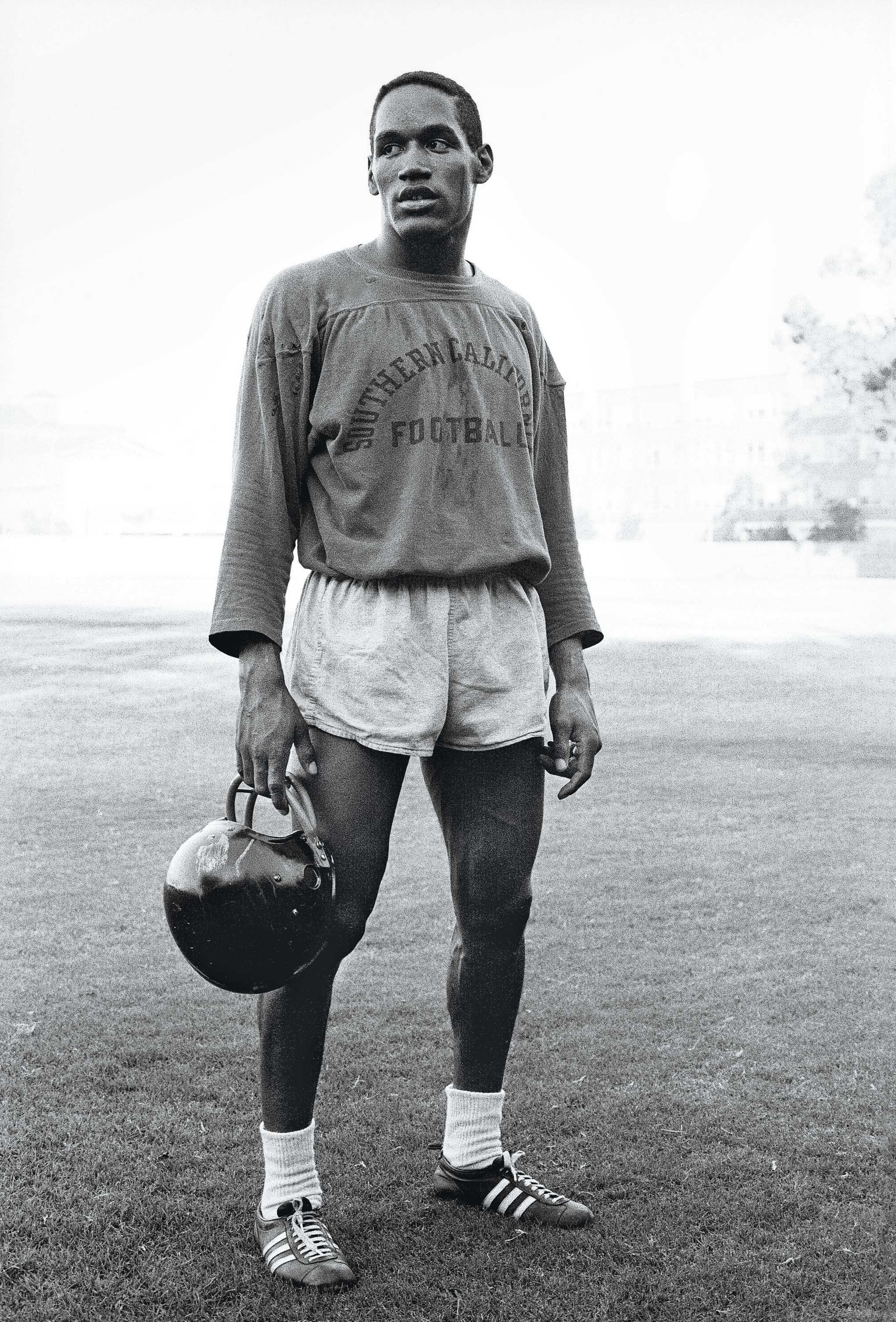
Orenthal James Simpson, the man at the center of ESPN’s five-part documentary O.J.: Made in America, was great at two things in particular: running and wanting. On the football field, Simpson was a genius of evasion. His deftness at avoiding opponents made him the first man ever to rush for 2,000 yards in an NFL season. After his retirement in 1979, he turned to comedy films, Hertz ads and sideline commentary as a way to pursue material success and respect from white America. It’s this quest that defined Simpson’s career in the years before his trial for the 1994 murders of his estranged wife Nicole Brown Simpson and Ron Goldman.
O.J. takes us from Simpson’s early stardom at the University of Southern California–a mostly white bubble floating above the racial unrest of the 1960s, where he marked the turbulent year of 1968 with a Heisman Trophy win–to his NFL years with the Buffalo Bills and San Francisco 49ers. Later, as a former athlete and newly minted media personality, he jumped Los Angeles’ racial divide, residing in luxe Brentwood. A former CEO of Hertz recalls getting Simpson into an exclusive country club: “They loved him, because he just fit in.”
His current incarceration for a 2007 armed robbery–sentenced to 33 years, he is eligible for parole next year–bookends the film, which is a tragedy several times over. There’s the horrible fact of two deaths–O.J. is unambiguous in its position that Simpson committed the murders of which he was acquitted–but the documentary is most interested in its subject’s belief that he had transcended race. In an interview unearthed by director Ezra Edelman, Simpson describes a character he’d wanted to play in the period film Ragtime: “Here was a black man at a time when you were supposed to know you were black.” If Simpson also spoke for himself, he was getting ahead of the story.
Edelman, who directed the Peabody-winning basketball documentary Magic & Bird: A Courtship of Rivals, skillfully depicts the crucial irony of Simpson’s acquittal. He got off, the film argues, thanks to the wariness of law enforcement shared by people for whom he’d never previously had time–African-American Angelenos just three years removed from the acquittal of the police officers who beat Rodney King. Once freed, Simpson tried, and failed, to rejoin Brentwood society. Off he went to the golf courses of Florida and to Las Vegas, seeking approval he couldn’t find in the familiar places.
Simpson’s story–ignited at the intersection of race, gender and celebrity–is rich territory and was already re-examined on television this year. But O.J. (which was briefly released in theaters to qualify for the Oscars) is no rehash. FX’s brilliant The People v. O.J. Simpson: American Crime Story hewed to the criminal trial, beginning with a murder and ending with a verdict. O.J. offers great insight into the case, including the claim by Simpson’s agent that Simpson ensured the famous glove would not fit by refusing to take his arthritis medicine. But this is less a crime story than a character study of a man who craved attention and found more than he ever imagined.
Edelman is a gifted curator, cutting together interviews–with subjects including former prosecutor Marcia Clark and two trial jurors–and footage from Simpson’s life. One clip shows a postrelease Simpson, near incoherent, yelling at a television about his persecution by district attorney Gil Garcetti. He can’t fathom what has happened to him except by framing it as a conspiracy.
What becomes of Simpson is all the more chilling in light of what we’ve seen. In 2006, he starred in a Punk’d-style reality show called Juiced, then attempted to publish the cynically conceived memoir If I Did It. He was arrested for armed robbery less than a year later and has been locked up ever since.
Simpson comes across, ultimately, as a cipher. He’s far from alone in his pursuit of fame–during his robbery trial, Clark turns up working as a reporter for Entertainment Tonight. But Simpson, who had run from San Francisco public housing all the way to Brentwood, sought to fill a different void.
And he still does. Shown in a meeting with supervisors at Nevada’s Lovelock Correctional Center, Simpson explains that he’s been on good behavior, working as a janitor and helping coach prison sports teams. With a smile, he says, “I like to say we won the championship.”
O.J.: Made in America premieres June 11 on ABC at 9 p.m. E.T. and continues on June 14, 15, 17 and 18 at 9 p.m. E.T. on ESPN
More Must-Reads From TIME
- The 100 Most Influential People of 2024
- The Revolution of Yulia Navalnaya
- 6 Compliments That Land Every Time
- Stop Looking for Your Forever Home
- If You're Dating Right Now , You're Brave: Column
- The AI That Could Heal a Divided Internet
- Fallout Is a Brilliant Model for the Future of Video Game Adaptations
- Want Weekly Recs on What to Watch, Read, and More? Sign Up for Worth Your Time
Contact us at letters@time.com